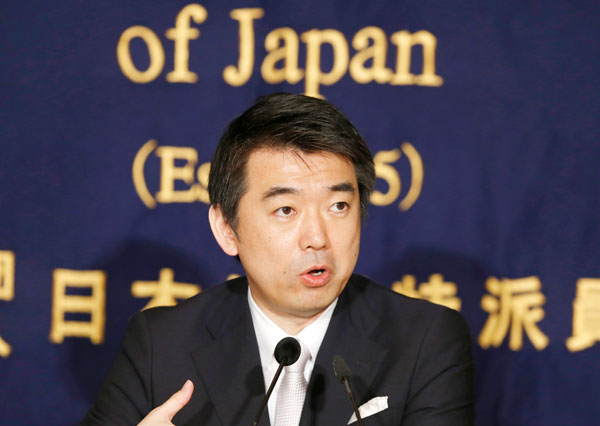Osaka mayor tries damage control
Updated: 2013-05-28 01:43
By Cai Hong in Tokyo (China Daily)
|
||||||||
Embattled Hashimoto says Japan not alone in wartime violation
Osaka mayor Toru Hashimoto is a reminder to other Japanese politicians of a basic political lesson: Watch what you say.
 |
|
Toru Hashimoto, Osaka mayor |
His insulting remarks about both US servicemen stationed in Okinawa and "comfort women" from the World War II era have created a crisis for himself and his Japan Restoration Party, which he co-heads with former Tokyo governor Shintaro Ishihara.
Hashimoto is being asked to resign as Osaka mayor. Public support is falling for his party, which was deemed a strong part of the "third force" for the Upper House election in July.
Looking for a political turnaround, he decided to reword his statement on Monday. He picked the Foreign Correspondents' Club of Japan, in Tokyo, to show his global vision this time.
Hashimoto urged the US military in Japan to enforce strict discipline for its servicemen and retracted his earlier suggestion that they use Japan's adult entertainment industry to prevent them from committing sex offenses.
He said on Thursday that he lacked "international awareness" when making the original remarks.
A large number of US troops are stationed in Japan. The rapes of Japanese women by some US servicemen triggered waves of protests against the US military presence in Okinawa and led to tight restrictions on off-base activities.
On May 13, Hashimoto said anyone can understand why comfort women - who were forcibly drafted into sexual servitude by the Japanese army - were necessary for brave soldiers who had been at the front lines. He also said that when he visited Okinawa to inspect the US Futenma air base in late April he asked a senior military officer to let US marines use local adult entertainment services.
Stern criticism
Hashimoto's remarks have drawn criticism inside and outside of Japan, including from the US State Department.
He is now trying to undo the damage his remarks have done to his political career and his party.
"I am totally in agreement that the use of comfort women by Japanese soldiers before and during World War II was an inexcusable act that violated the dignity and human rights of the women, in which large numbers of Korean and Japanese were included. I am totally aware that their great pain and deep hurt were beyond description," said the statement Hashimoto issued on Sunday.
"I also strongly believe that Japan must reflect upon its past offenses with humility and express a heartfelt apology and regret to those women who suffered from the wartime atrocities as comfort women. Our nation must be determined to stop this kind of tragedy from occurring again."
But he qualified Japan's wrongdoings by pointing the finger at other countries for the same faults. To the embattled Hashimoto, Japan should not be the only one condemned for sex slavery.
"A not-insignificant number of other nations should also sincerely face the fact that their soldiers violated the human rights of women. It is not fair to blame Japan only, as if the violation of human rights of women by soldiers were a problem unique to the Japanese soldiers," he said in the statement.
"Sexual violation in wartime was not an issue unique to the former Japanese army. The issue existed in the armed forces of the US, the UK, France, Germany and the former Soviet Union among others during World War II. It also existed in the armed forces of the Republic of Korea during the Korean War and the Vietnam War."
He cleared the wartime Japanese government and military of responsibility for the forcible recruitment of "comfort women". He said that the Japanese government denied it in its 2007 cabinet decision because there was no evidence.
A historical revisionist, Hashimoto can hardly win trust with his new clarifications.
In an interview with ribenxinwen.com, a Chinese website in Japan, former Japanese prime minister Tomiichi Murayama said Hashimoto's remarks about "comfort women" were outrageous. Murayama issued an apology in 1995 for the "tremendous damage and suffering to the people of many countries, particularly to those of Asian nations" Japan had caused "through its colonial rule and invasion".
Murayama said a politician should have a responsible attitude, and the denial of history will ratchet up tensions between Japan and its neighbors.

 Michelle lays roses at site along Berlin Wall
Michelle lays roses at site along Berlin Wall
 Historic space lecture in Tiangong-1 commences
Historic space lecture in Tiangong-1 commences
 'Sopranos' Star James Gandolfini dead at 51
'Sopranos' Star James Gandolfini dead at 51
 UN: Number of refugees hits 18-year high
UN: Number of refugees hits 18-year high
 Slide: Jet exercises from aircraft carrier
Slide: Jet exercises from aircraft carrier
 Talks establish fishery hotline
Talks establish fishery hotline
 Foreign buyers eye Chinese drones
Foreign buyers eye Chinese drones
 UN chief hails China's peacekeepers
UN chief hails China's peacekeepers
Most Viewed
Editor's Picks

|

|

|

|

|

|
Today's Top News
Shenzhou X astronaut gives lecture today
US told to reassess duties on Chinese paper
Chinese seek greater share of satellite market
Russia rejects Obama's nuke cut proposal
US immigration bill sees Senate breakthrough
Brazilian cities revoke fare hikes
Moody's warns on China's local govt debt
Air quality in major cities drops in May
US Weekly

|

|







